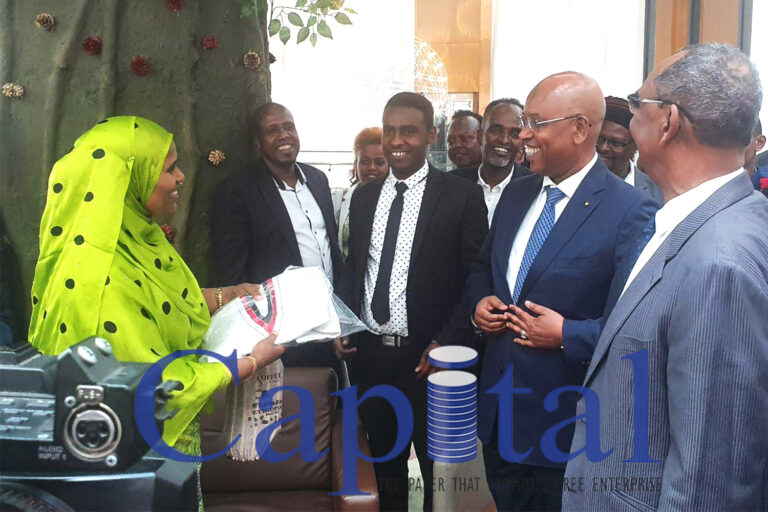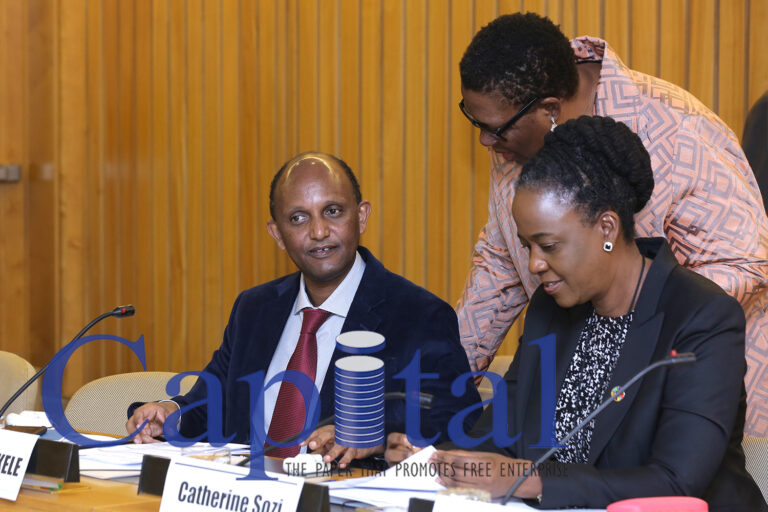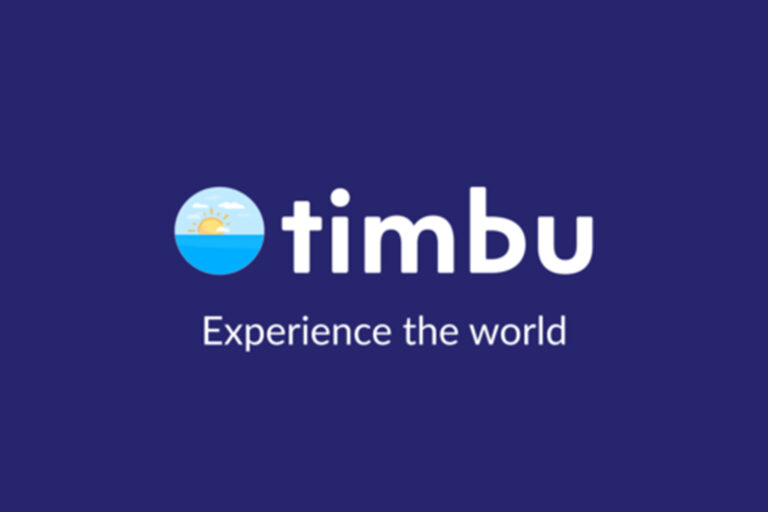The Ethiopian Electric Power /EEP/ announced that the construction of Genale Dawa III dam is completed and ready to start generating power after ten years of construction.
Genale Dawa III hydropower project launched in 2010, has the capacity to generate 254 MW with three turbines each with a generating capacity of 84.7 MW.
The dam is 110 meter high and 426 meter long and has the capacity to hold 2.5 billion cubic meters of water.
Out of the total cost of the project which is 451 million dollar, 40 percent of the finance is covered by the Ethiopian government and the rest 60 percent covered by a loan from the Chinese EXIM bank.
The construction of the dam was done by China Gezhouba Group /CGGC/.
The project which was started ten years ago was expected to be finalized within four years but was delayed because of resettlement issues near the dam according to Moges Mekonnen, corporate communication director of EEP.
Genale Dawa III hydropower project is located in the Southeast Ethiopia in Oromia regional state, 630 km from the capital.
The new dam is expected to increase the country’s generation capacity to 4,514MW from the current 4,260MW.
The energy sector is one of Ethiopia’s priorities as the country envisages becoming a light manufacturing hub in Africa together with a middle-income economy by 2025.
Ethiopia plans to increase its current electricity generation capacity to 17,300 MW by 2025, with power generation projects in hydro, wind, geothermal and biomass sectors.
Genale Dawa III enters the national grid
Djiboutian business delegation keen on investment opportunities
A high level delegation comprised Djiboutian business community visits business destinations and potentials in Oromia region and formed a joint committee to solve problems.
The delegation that was led by Youssouf Mousa Dawaleh, President of the Chamber of Commerce of Djibouti (CCD) , visited industrial parks based in Oromia region and the Mojo Dry Port on its three days visit concluded by a discussion held on Saturday January 25 at Ethiopian Skylight Hotel.
Chaltu Sani, Vice President of Oromia region, who co-chaired the discussion with CCD president, said that the aim of the visit and discussion is to boost the relationship, investment and tackle contraband business that affects both sides.
It has been recalled that a delegation led by Shimelis Abdisa, Vice President of Oromia region, visited Djibouti in the second week of December, 2019 and the latest Djiboutian visit is the continuation of that by the invitation of the region leader, according to the CCD President.
“Our visit is to meet and discuss on several issues with the business community and authorities in the region. The very gist of the visit was seeing the way to strengths link between the two business communities in different areas,” Youssouf Mousa Dawaleh told Capital.
According to Youssouf Mousa, both sides have common interest and joint business development and the current visit shall put clear vision regarding that.
Several issues have been discussed mainly on the export of khat, fruits and vegetable and coffee.
“There are some members who were already ready to invest in several activities and we hope that we will conclude this with a permanent joint committee formed between the two sides,” Youssouf Mousa said.
Chaltu told Capital that Djibouti is the closest ally of Ethiopia and for the region specifically since most of the export commodities to Djibouti are produced in Oromia.
“The product of our farmers is exported to the country but with past bad practices in the region they are not getting adequate benefit compared with their production,” she said.
According to the Vice President, a study undertaken by the region indicated that the farmers were only benefiting 8 percent from the khat business, which indicates that how the contraband business damages both.
“The contraband was the major challenge for the area, however we have formed a joint committee that will tackle the problem,” she added.
Abdourahman Elmi Ismael, first secretary of CCD and chair of the joint committee formed by the two sides, said that the Ethiopian investment policy is improving these days.
Some of the Djiboutian investors, who are considered as Ethiopian national based on Ethiopian law, are already interested to invest in the region.
Abdourahman Elmi told Capital that the delegation actors expressed their interest to invest in Ethiopia.
“The Ethiopian law that considers Djiboutian as Ethiopian is something very important for Djiboutian but we have to develop that and encourage and inform people about that since most of our people don’t know that,” he added.
Payment issues for transit companies in Djibouti, export items quality were part of the concerns raised at the joint committee meeting that was held at the final day of the visit.
Ethiopian Human Rights Commission embarks on a reform
Ruth Brook
A reform is on the horizon for the Ethiopian Human Rights Commission (EHRC). The institution, in collaboration with the Office of the High Commissioner for Human Rights-East Africa Regional Office (OHCHR-EARO), held a stakeholders’ consultation to discuss the roadmap to change. The one-day consultation took place on the UN ECA compound on 30th January 2020.
Concerns raised and addressed included whether or not enough people know about the commission and its mandate, if it reflects the needs of Ethiopia, how relevant is EHRC to the people of Ethiopia and what the best practices for future improvement are.
“Despite the challenges, we remain hopeful that there is a historic opportunity in Ethiopia to consolidate human rights gains, to consolidate democratic gains ad keep Ethiopia on the right trajectory. As part of this initiative, one of the tasks we are committed to is a genuine, radical, institutional reform of the commission to make it fit for purpose, in a way that it is able to deliver all the mandates for which it is established, which is one of promotion and protection of human rights,” said Daniel Bekele (Ph.D.), Chief Commissioner, EHRC.
The EHRC is state body that was established in 2000 and became operational in 2004 following the appointment of its first commissioners. In its established proclamation, the EHRC’s objectives were to raise public awareness on human rights, to promote, protect and enforce human rights as well as take necessary measures when violations occur. To date, EHRC’s achievements have been described as “modest”. Both national and international actors have suggested improved human, technical and financial resources for the commission.

In keeping with its nature of inclusivity, EHRC called on panelists with expertise in Human Rights and stakeholders from diverse sectors to voice their opinions on the current state of the commission and their thoughts on how to move forward. Participants included representatives from government organs, community and religious leaders, political party representatives, journalists and media, UN agencies and academicians to name a few.
The program opened with welcoming remarks from Daniel Bekele and Catherine Sozi, UN Resident Coordinator Officer, followed by an introductory speech from Nwanneakolam Vwede-Obahor, Regional Representative, OHCHR-EARO.
Panelists included Wondemagagen Goshu (Ph.D) from Addis Ababa University Centre for Human Rights, Abraham Leyew, former EHRC Advisor on Legal and External Affairs, Emebet Kebede, Human Rights expert and Imad Tune, Human Rights expert. All four panelists presented their ideas for the reform.
Independence from the Government of Ethiopia is at the cornerstone of transformation for EHRC, explained Imad. Institutional independence will allow the commission to decide when and how they will act without any limitations, a scenario where EHRC has financial independence is also ideal, he said.
Accessibility of branch offices was one of the primary issues addressed by Emebet, who revealed that there are only 8 branches nationwide, an inadequate amount for a country with a population of over 100 million. She suggested that the commission needs to come to the “community level”, it needs to be reintroduced to the public, she stated. Emebet also mentioned that architectural reimaging of the EHRC should be a priority, the current headquarters are not “publically visible” and some of the current offices do not cater to persons with disabilities, she said.
Representation within the commission was another major topic of conversation amongst the panelists. Imad called for the diversification of the EHRC, at both the staff and commissioner levels. Diversity in ethnicity, gender, religion, race and language should be at the forefront of the reform in order for the people of Ethiopia to see their reflection in EHCR, he emphasized.
The response to the reform agenda was positive and hopeful; with a few of the stakeholders present describing it as “timely”. The consultation was the first of a series of nation-wide consultations that ERHC plans to undertake. The Commission wants to engage as many state and non-state actors across the country this year.
Mauritian travel agency to invest in 20 Ethiopian startups
Ruth Brook
Local travel startups are in luck as a Mauritian online travel agency is looking to give a financial boost to the tune of $25,000 to 20 Ethiopian startups focusing on the travel industry. The Mauritian travel site, Timbu.com, focuses on African destinations and has revealed plans to invest a total of $500,000 in early-stage East African travel startups.
Timbu is currently a market leader in Nigeria and other West African countries; the company has backed some startups in the region, namely Hotels.ng and OgaHotels. With its footprint already in West Africa, Timbu wants to extend its reach to the opposite end of the continent. As a result, Timbu recently launched an investment arm to fund entrepreneurs and startups in Ethiopia.
The emergence into East Africa comes at a time when there is a need to grow the existing technology ecosystem in the region, said Timbu’s media representative. The company aims to supply entrepreneurs with the necessary resources to grow the startup scene in the region.
The funding the chosen startups will receive will be a seed fund that is intended to help them launch their minimum viable products (MVPs) – an early version of their final product, with sufficient features, that can still be released for early audiences.
In order to receive the funds, startups need to be active in the travel industry and solve “real issues” in the hospitality niche. Priority is given to startups that focus on curated travel, an online travel agency service that is one of the fastest growing sectors of the industry. In addition to the financial backing from Timbu, startups will receive mentoring and coaching from the agency.
“Our intentions are to also guide the startups with getting their initial customers, gain traction, as well as provide them with the ‘best talents’, so as to assist the selected startups to gain Series A and B funding”, said the agency’s media representative.
Timbu is backed by investors who are interested in Africa’s growth and development as a travel destination. Timbu hopes this investment will encourage other angel investors to fund East African startups.
Startups wishing to apply for the funding are required to submit an application disclosing the name of their company and founders, problems they aim to solve in Ethiopia, who are their competitors and how they intend to make money.
Interested startups are required to submit a document containing the following information:
- Company name
- Company URL, if any
- Name and email of the founder(s)
- Role of each founder
- What your company is making and the problem it aims to solve in Kenya
- Who your competitors are and what gives your company edge over them
- How your company intends to make money
All applications should be submitted to funding@timbu.com with the subject line as “{Country} Startup Funding Application” (e.g. Ethiopian Startup Funding Application).






